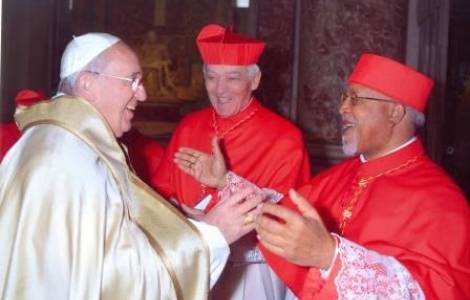
Addis Ababa (Agenzia Fides) - "In Ethiopia there are several conflicts, but we must never lose hope", says Cardinal Berhaneyesus Demerew Souraphiel, Metropolitan Archbishop of Addis Ababa, who gave an interview to Fides.
Your Eminence, Ethiopia is the scene of several internal conflicts. What are the consequences for the population?
Ethiopia is facing several conflicts that are causing great suffering to the populations concerned. Two years ago we had the Tigray war which ended with a peace treaty signed in Pretoria, South Africa. But there is a war in the Oromia region in the southeast of the country that has continued for four years, where many Oromo people have been killed and many others have been forced to flee, especially the populations of Amhara origin living in Oromia who were forced to flee. This conflict is still ongoing, but the Ethiopian federal government and the Oromo Liberation Army have started talks in Tanzania. They have met twice but have not yet managed to reach an agreement.
The humanitarian needs in Oromia are very great, both for the displaced people and for those who remain but are suffering the consequences of four years of war. The same has been happening for a year and a half in the Amhara region where fighting broke out between the federal government and the Fano (Amhara militia, editor's note). We hope that they will find a mediating country where they can discuss and thus end the war. Finally, there are local conflicts here and there in other parts of the country, but the main ones are in Tigray, Amhara, Afar and Oromia.
The Catholic Church, through the Caritas Internationalis network, tries to help as many people as possible.
As you know, the Catholic Church is a small reality in Ethiopia, but it tries to reach as many displaced people and people living in war as possible to offer them help.
In addition to physical wounds, there are psychological and spiritual wounds. What can be done to cure them?
Every war leaves many people affected, not only in their bodies, but also in their souls and spirits. These are often women, children and the elderly, in addition to the soldiers who are fighting. The Church wants to offer help in the social, psychological, spiritual and trauma treatment areas. Particular attention must be given to children and their mothers; I remind you that many children cannot go to school because several school buildings have been destroyed. Particular attention must also be paid to female victims of rape.
Trauma care begins at the village level and continues to the district, zone and regional levels. This is why we train all our religious staff, men and women, as well as seminarians and catechists so that they can help in this area. This is a very important activity.
Does ecumenical and interreligious dialogue contribute to the search for peace?
The Catholic Church is a founding member of the Inter Religious Council of Ethiopia where all faiths, Christian and Muslim, work together, especially in the area of reconciliation and healing from war trauma, which needs time to be effective in humanitarian assistance (distribution of food, medicines and basic necessities). At the Inter Religious Council of Ethiopia, we work with the Patriarch and Synod of the Ethiopian Orthodox Church, as well as the Islamic Council of Ethiopia at the national and local levels. We also work with the Evangelical Ethiopian Council, Adventists and others.
By working together in the humanitarian field, we are able to be more effective at the national level, where we have been recognized by the federal government.
What are the hopes for Ethiopia?
There is always hope. Ethiopia is a very old Christian country in which the majority of the population is Christian. Ethiopia as a country was not born 50 years ago, it has a history of at least three thousand years of peaceful coexistence between religions. Jews, Christians and Muslims have lived in peace for centuries and we want to continue to do so. On the other hand, there are several dividing factors. One of them is ethnic federalism. Federalism is a good system, but we believe it should not be based on ethnicity or language. From a geopolitical point of view, Ethiopia is an important country. We currently have 120 million inhabitants; in Africa, after Nigeria, the country with the largest population is Ethiopia. Seventy percent of the population are young people who love their country but, due to poverty and conflict, are forced to emigrate. Many of them go to the Middle East and South Africa, others to Libya and then try to reach Europe.
As Catholic Church, we believe this is not the solution. We need to train young people for professions in their own countries, so that even if they go abroad, they are well paid and respected. We ask you to help us train our young people.
The entire Horn of Africa needs people with professional skills. Either way, Ethiopia is growing economically, there are manufacturing industries that can now take advantage of the electricity produced by the Grand Ethiopian Renaissance Dam. We need peace, education and investment to strengthen our industry and export products whose proceeds can be reinvested in the national economy to create more factories and jobs. (L.M.) (Agenzia Fides, 5/7/2024)